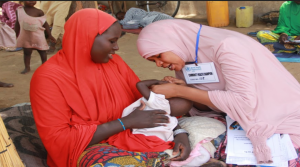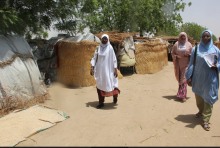Nigerian women are penetrating enclaves to reach children and vulnerable populations.
Abuja, 13 March 2019 - “In Northern Nigeria where I work as a nurse and polio vaccinator, only women are allowed to enter houses because most women in this part of the country are in purdah (practice of seclusion)”, says Ramatu Garba of Dala Local Government in Kano State.
Not only that, many times, mothers require the permission of their spouses to take ailing children to hospitals.
Recognizing these limitations early in the Polio Eradication Programme, the Government of Nigeria with support from the World Health Organization and partners including UNICEF and CORE Group resorted to engaging mostly females to overcome the challenges of reaching eligible children in the household.
Over 360,000 vaccinators are engaged to support each round of national polio campaigns and a further 180,000 for a round of sub-national campaigns. Out of these, more than 80% of the house to house vaccinators are females. In addition to this, the polio programme deployed more 90% female supervisors to monitor the vaccination teams. A further profiling of personnel for all vaccination teams (including fixed post and transit point teams) indicate that 62% of the vaccinators are females.
According to Ramatu Garba, “when you are a female health worker, it is easier to gain access and provide quality support to areas with gender restrictions, not only during polio but other public health campaigns.”
This is in line with the theme of 2019 International Women’s Day, “Think equal, build smart, innovate for change”, a clarion call to all towards rapid economic and transformational development achieved by addressing and resolving the gender-based differences relating to health needs, risk behaviour, and access to health services.
Healthy empowerment
Aside from the treatment of minor ailments and vaccination of eligible children, there is considerable anecdotal evidence from WHO Nigeria field offices in Kano, Katsina and Kaduna states that the huge investments by donors and partners have gone beyond polio eradication to impact positively on the lives of women, thereby enhancing equity.
Happy Gabriel is a student at Kaduna Polytechnic. She became a vaccinator three years ago after gaining admission for her diploma course. Polio programme stipends assisted her to concentrate on her studies and helped greatly to buy books and for her upkeep.
Like Happy, Aishatu Bello is also a local vaccinator and had never seen a bank in her life,
“I saw the four walls of a bank for the first time in my life courtesy of WHO’s direct disbursement mechanism. Having my money safely in my bank account has given me financial freedom and a sense of empowerment.”
Initiated in 2004 by the WHO, Direct disbursement Mechanism (DDM) allows for the payment of vaccination teams’ allowances directly to their bank accounts thereby mitigating financial risks and increasing accountability and transparency.
Females are crucial in mounting initial response to disease outbreaks
WHO has prioritized and promoted leadership in gender, equity and rights across all its health policies and programmes with a view to achieving universal health coverage and attaining the triple billion goals set out in our new Programme of Work.
In Nigeria, “Field personnel are mostly females, especially in the northern states where female polio personnel comprising cluster coordinators, local government area facilitators and field volunteers have the experience and have always worked with community leaders to combat disease outbreaks on preventive and control measures including health education”, says Dr Clement Peter the WHO Officer in Charge (OIC).
With lessons learned and positive engagement of women to strengthen the health system in Nigeria, WHO will continue to provide requisite technical support to the State Ministries of Health and to increase the proportion of female engagement, especially on community engagement in efforts to forestall and respond to disease outbreaks.




